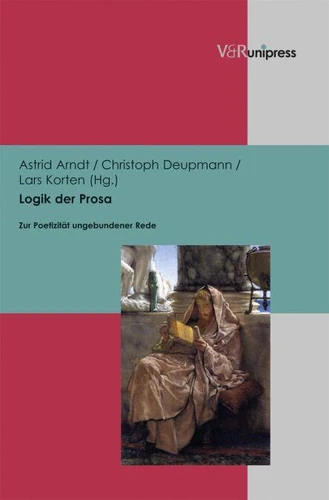Logik der Prosa. Zur Poetizität ungebundener Rede
Par : , ,Formats :
Disponible dans votre compte client Decitre ou Furet du Nord dès validation de votre commande. Le format PDF est :
- Compatible avec une lecture sur My Vivlio (smartphone, tablette, ordinateur)
- Compatible avec une lecture sur liseuses Vivlio
- Pour les liseuses autres que Vivlio, vous devez utiliser le logiciel Adobe Digital Edition. Non compatible avec la lecture sur les liseuses Kindle, Remarkable et Sony
 , qui est-ce ?
, qui est-ce ?Notre partenaire de plateforme de lecture numérique où vous retrouverez l'ensemble de vos ebooks gratuitement
Pour en savoir plus sur nos ebooks, consultez notre aide en ligne ici
- Nombre de pages333
- FormatPDF
- ISBN978-3-86234-961-6
- EAN9783862349616
- Date de parution20/11/2012
- Protection num.pas de protection
- Taille2 Mo
- Infos supplémentairespdf
- ÉditeurV&R Unipress
Résumé
The idea is compelling that literary prose obeys a specific logic when it tries to be accepted as a form of art. Lacking the evidently artificial character of formed poetry, literary prose needs to develop specific techniques to mark its difference from 'prosaic' speech. The history of this idea and of the aesthetic implications still remains to be written. The authors of this volume intend to close this gap by unfolding the conceptual and historic dimension of the 'logic of the prose': focusing on fictional and non-fictional genres (drama, novel, diary, essay), on sophisticated forms as well as on apparently inartificial forms, on epics as well as on juvenile literature or dime novels.
The volume includes also studies on literary texts from the 18th century until today.
The volume includes also studies on literary texts from the 18th century until today.
The idea is compelling that literary prose obeys a specific logic when it tries to be accepted as a form of art. Lacking the evidently artificial character of formed poetry, literary prose needs to develop specific techniques to mark its difference from 'prosaic' speech. The history of this idea and of the aesthetic implications still remains to be written. The authors of this volume intend to close this gap by unfolding the conceptual and historic dimension of the 'logic of the prose': focusing on fictional and non-fictional genres (drama, novel, diary, essay), on sophisticated forms as well as on apparently inartificial forms, on epics as well as on juvenile literature or dime novels.
The volume includes also studies on literary texts from the 18th century until today.
The volume includes also studies on literary texts from the 18th century until today.



